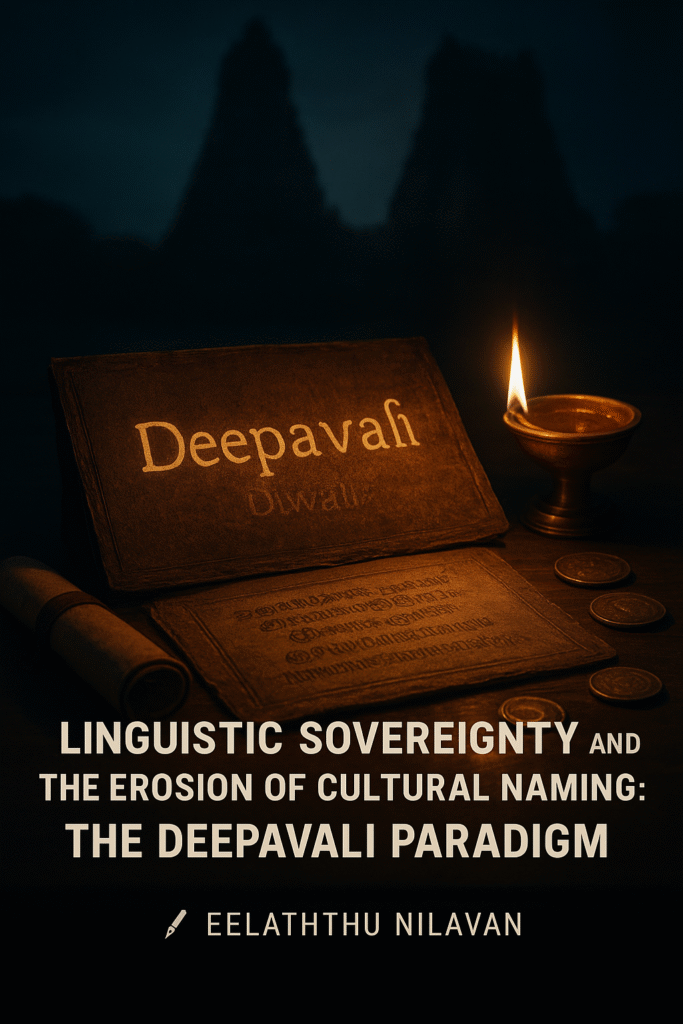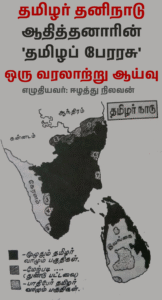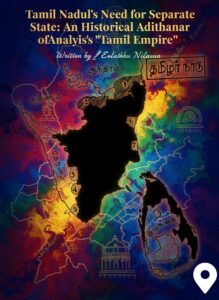The seemingly simple substitution of ‘Deepavali’ with ‘Diwali’ is not merely a phonetic simplification; it represents a profound case study in the dynamics of linguistic drift, cultural erasure, and the imperative for linguistic sovereignty. This phenomenon, mirroring the historical manipulation of place names, necessitates a deeper and more rigorous defence of original linguistic forms.

The Etymological Compromise: Deepavali ➾ Diwali
The name of the ‘Festival of Lights’ is rooted in the Sanskrit term ‘Dīpāvalī’ (Dīpa + Āvalī), meaning “A Row of Lights.” This name is an intrinsic semantic marker, directly communicating the essence of the ritual: the lighting of lamps (dīpa) in a continuous series (āvalī) to symbolise the victory of knowledge (light) over ignorance (darkness).
The derivative, ‘Diwali,’ prevalent in North Indian vernaculars and subsequently adopted by global media, is a phonetic truncation. While standardisation through abbreviation is common, when the derivative supplants the original, it severs the direct, transparent link between the signifier (the word) and the signified (the cultural meaning). By promoting ‘Diwali,’ we tacitly agree to the dilution of the name’s full semantic power, reducing a precise etymological compound to an unanalysable, generic label.
The passive adoption of the shortened form by cultures that adhere to the original, such as the Tamil-speaking world, constitutes a subtle linguistic capitulation. This is particularly critical as Deepavali remains the established, formal, and culturally resonant term across South India, Malaysia, Singapore, and the diaspora.
The Parallel of Toponymic Erosion
Your comparison to place-name alteration highlights a historical mechanism of cultural subjugation. Toponymic (place name) changes serve as a crucial metric for measuring the impact of foreign influence or linguistic hegemony.
● Pāruttittuṟai (Cotton Harbour) ➾ Point Pedro: The indigenous name, rich with socio-economic history (indicating a trading port), is replaced by a navigational marker.
● Yālppāṇam (Jaffna): The name, carrying a specific cultural narrative, is distorted into a phonetic approximation.
● Ānaiyiṟavu (Elephant Pass): The name, which potentially reflects ancient trade routes or geography, is rendered via simplistic, literal translation.
In each instance, the original name, a linguistic artefact bearing intrinsic cultural data, is suppressed. The acceptance of the derivative name is synonymous with the internalisation of a historically imposed linguistic hierarchy. The language that loses control over the naming process cedes a degree of control over its own narrative and history.
The Reclamation of Linguistic Autonomy
The political and cultural movements to revert names like Madras to Chennai and Bombay to Mumbai signify a critical reassertion of linguistic autonomy. These reclamations are not mere acts of nostalgia; they are fundamental acts of decolonisation.
The process of decolonisation demands that the nomenclature used for places and institutions reflect the authentic, unbroken history of the indigenous population. These name changes serve to:
❶ Re-establish Identity: Connecting the modern city with its historically and locally validated linguistic root.
❷ Affirm Cultural Sovereignty: Declaring that the local language (Tamil, Marathi) holds the highest authority over its own lexicon and naming conventions.
This global trend confirms that retaining the original form is a prerequisite for robust cultural self-determination.
The Mandate for Conscious Preservation
For scholars, historians, and culturally engaged individuals, the challenge is to move beyond passive observation to active linguistic stewardship.
The integrity of a language is not just maintained by grammar but by the vigilant protection of its canonical forms. In contexts where the original form is known and valued, a sustained effort must be made to:
❶ Prioritise Deepavali: Consistently use the full, etymologically correct form in formal writings, cultural discourse, and educational material, particularly within the Tamil and South Asian diaspora.
❷ Educate on Derivation: Frame ‘Diwali’ explicitly as the shortened derivative of the original Sanskrit Dīpāvalī, thereby acknowledging the source without fully endorsing the abbreviation.
❸ Insist on Local Forms: Advocate for the use of linguistically appropriate names in official, media, and academic communications, treating the original name as the primary cultural identifier.
Ultimately, the choice between ‘Deepavali’ and ‘Diwali’ is a symbolic measure of a community’s commitment to its linguistic patrimony. To resist the inertia of phonetic simplification is to exercise true cultural sovereignty.

Written by: Eelaththu Nilavan
Tamil National Historian, Analyst of Global Politics, Human Rights, Economics, Intelligence, and Military Affairs



